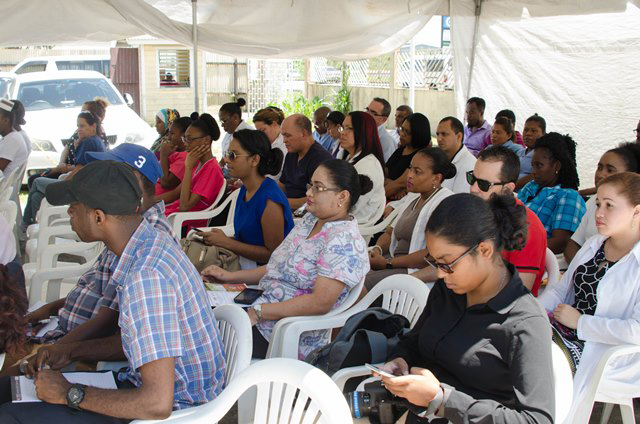Residents and other stakeholders within the Diamond/Grove community were on Wednesday invited to a public consultation for the retrofitting of the Diamond Diagnostic Centre to that of a SMART hospital.
A collaborative effort of the Ministry of Public Health, Pan American Health Organisation (PAHO) and the UK Department for Inter-national Development, the project is one which seeks to improve the standard of healthcare delivery while also ensuring environmental sustainability and safety.
Stabroek News understands that Diamond is one of five health facilities selected following a series of cost-benefit and safety assessments conducted at more than 50 health facilities across the country. Selected along with Diamond for the retrofitting process are the Leonora Cottage Hospital, Lethem Regional Hospital, Mabaruma District Hospital and the Paramakatoi Health Center in Region 8.

In attendance at the consultation were PAHO Country representative Dr. William Adu-Krow, British High Commissioner (Ag) Ray Davidson, Minister within the Ministry of Public Health Dr. Karen Cummings, Regional Vice Chairman Earl Lambert and other officials.
The Minister in her remarks underscored the importance of embracing the SMART hospital initiative, as there is need for health facilities that are able to function optimally, particularly when faced with threats and occurrences of man-made and natural disasters.
Added to this, she said is the opportunity to not only open new doors for medicine but also redefine the delivery of health care in the country, through improvements in infrastructure and operational procedures.
“This concept of SMART hospital is based on optimization and automation of processes in the ICT environment of interrelated objects. The purpose of this SMART environment is to improve existing procedures for the provision of advanced means of medical care and to open up new opportunities for medicine. Guyana has joined the rest of the world in embracing the SMART hospital initiative and will not be left behind as the world moves in the direction of providing healthcare that is safe, sustainable and affordable,” the Minister said.
Meanwhile, Dr. Adu-Krow noted that though it is important for countries to adopt SMART hospital initiatives as a national policy for risk reduction, it is equally important to have feedback from those who will be utilizing the facility and services.
“Integral to this project is the input of you the people, the community, the staff of this facility, persons who seek treatment at this facility. Today’s activity is definitely a demonstration of commitment of such involvement and I sincerely hope that at the end of today’s consultation that you would have an understanding of the concept of the project and what will happen at your facility, the Diamond Diagnostic Centre, after it is retrofitted,” he posited.
“It is my hope that whatever gains made will be pushed back into the system, whatever savings made will also be pushed back into the system and that we also use funds to retrofit those that will not be retrofitted with assistance from different donors,” Dr. Adu-Krow added.
Similar sentiments were shared by Acting British High Commissioner Ray Davidson who explained that a key part of the review process for the project is raising and receiving feedback from those who will directly be affected by the implementation of the project.
The High Commissioner, offering a brief overview of the progress made with the project thus far, explained that general contractors and design firms were hosted at a seminar last October where they were introduced to the SMART healthcare facilities project and provided with guidance on the PAHO procurement process. Firms were then invited to register on the UN Global Market database, which made them eligible for consideration.
From there, Davidson noted that site visits were carried out in February this year and the tendering process for design done.
Additionally, the project has also allowed for Contingency Plan Training, Conservation Plan Training, Training for Maintenance Staff for the facilities selected, Knowledge, Attitude and Practice Survey, Occupation Satisfaction Survey, and consultation with the community on the design.
“However, part of this review is to get your review and those of others who will be directly affected, this is your chance to engage in the process and I would urge you to do so in order to ensure that what we deliver is what is needed by the people who use this facility,” Davidson added.
Meanwhile, Rawle Jordan, Principal Consultant for the project, offering a technical overview of the works, suggested possible changes to the functionality aspect of the facility at Diamond to better utilize the space that is available at the facility.
Added to this, would be implementation of more sustainable water and energy consumption and harvesting methods.
Stabroek News had reported earlier this year that a total of £38 million is expected to be spent to retrofit 50 facilities in seven Caribbean countries; namely Guyana, Belize, St Vincent and the Grenadines, St Lucia, Jamaica, Grenada and Dominica over the next three years.






